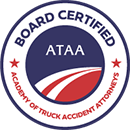Dump Truck Accidents
If you look around you when riding down the road, you’re bound to see a dump truck. After all, they’re used for hauling all types of goods around, including unwanted household goods, landscaping or construction materials, and more.
These trucks pose dangers both on the road and off on worksites. Countless individuals unnecessarily get hurt in preventable accidents involving dump trucks every year across the United States. If you happen to be one of them, a dump truck accident lawyer from Trucking Injury Law Group can help. Read the information below, then call or email to schedule a free consultation to learn more about our commitment to advocating for truck accident victims like yourself.
What Are the Causes of Dump Truck Accidents?
The reasons dump truck accidents occur are about as varied as the different types of cargo they haul. Some of the more common culprits responsible for causing injuries to surrounding passenger car drivers and their passengers, motorcyclists, pedestrians, and others include:
Improperly Stored Cargo
Individuals using these trucks often must pay on a per-load basis. This detail leads many carriers to overload these trucks’ beds well beyond manufacturers’ weight limits or so that materials placed within extend beyond the fill line.
As you might imagine, situations in which a few leaves or a thin tree branch happen to be the loose materials that get away from the open trailer may not pose any real dangers to those nearby. However, massive amounts of tree trimmings or debris could, at the very least, blind motorists, resulting in them causing a crash.
Instances where the loose material consists of heavy objects are particularly dangerous. They could easily become dislodged and unstable if a trucker abruptly applied their brakes or simply with gravitational shifts, resulting in it falling out of the truck onto another person or smaller vehicle. The Federal Motor Carrier Safety Administration (FMCSA) requires 18-wheeler operators to follow certain cargo securement rules, and dump truck operators must do the same for the safety of those around them.
Dump Truck Driver Misuse of Hydraulics
The bed of a dump truck operates on hydraulics. All it takes is a dump truck driver improperly activating or failing to disengage the power take-off system, which is attached to the hydraulic cylinder responsible for lifting the bed, for a potentially catastrophic issue to arise.
Some issues that have notably been reported on in the media in recent years that are attributable to dump truck operator error such as this include:
- Instances in which the bed of the dump truck have dropped their load prematurely
- Situations where the bed was left up in the air, extending the height of the truck, causing it to strike roadway signs, street lights, or pedestrian or car bridges, leading them to become damaged or dislodged and strike others
Failures To Check Blind Spots
Another driver error often responsible for dump truck crashes is a failure to check blind spots before passing, merging, or shifting into reverse.
Sideswipe accidents may occur whereby the dump truck operator strikes other drivers if they fail to check their blind spots while moving about. A back-up accident in which a person gets struck, suffering severe injuries such as crush ones, can occur if this happens. Such a crash can also cause significant property damage.
Mechanical Issues
Dump trucks are just as vulnerable as any other big truck to having mechanical problems. However, one area in which they are unique is that these types of trucks are often utilized in construction zones or demolition sites where there may be an abundance of nails, broken shards of glass, and other building materials that can easily puncture tires, leading to a blowout while it’s being driven down the road.
Tire blowouts can cause even safe drivers to suddenly lose control over their vehicle or for it to abruptly stop in traffic while driving through residential areas or on the interstate, causing a crash.
Exceeding Weight Capacity Limits
State truck weight limits generally vary depending on how many axles the vehicle has. The average per axle weight limit for trucks is roughly 20,000 pounds. This means your typical dump truck that has three axles can potentially weigh over 60,000 pounds. This is significantly larger than the 3,000-pound weight of an average car.
The heavier a load, the more time a truck needs to reach a full stop at stop signs, lights, or other traffic signals when applying the brakes. Gauging a truck’s weight may prove challenging when the dump truck driver is constantly picking up random loads of heavy materials at different locations like a construction site.
An inexperienced trucker may not be as keen on what happens when you attempt to brake at a short distance with often ill-packed and weight-variable loads like fully loaded dump trucks often haul. The combination of these factors can result in a crash.
It’s also worth noting that aside from the aforementioned, any number of trucking law violations that often result in other truck accident cases may also apply to dump truck crashes, including:
- Working long hours and being fatigued, impacting judgment
- Drug or alcohol intoxication, which can impair motor skills
- Being given too limited driving hours by an employer to get a job done, resulting in a trucker feeling pressured to speed
Who Can Be Held Liable for a Dump Truck Accident?
While it may initially seem like the operators at the wheel of these vehicles—the commercial driver’s license holders—would be wholly responsible for dump truck accidents from a lay person’s perspective, that’s generally not the case. Truck driver aside, the following parties are often additionally liable parties in dump truck crash cases:
- The driver’s employer: A trucking company may be held responsible for the accident if they knew about, yet failed to address, potential mechanical issues with the truck, such as its hydraulics. Trucking companies may also be deemed a negligent party if they were irresponsible in hiring dump truck drivers.
- A mechanic who previously worked on the truck: If a truck was recently worked on at a third-party shop, for example, and it can be proven that stated repairs weren’t made or certain obvious mechanical issues weren’t identified and addressed, then it may be possible for an auto mechanic to be held liable for their oversights that resulted in the crash.
- Government agency: Many dump trucks are operated by private parties; however, city, county, and state government agencies also use these large vehicles to haul around salt for treating roads when it’s snowing, household good haul-aways, and for transporting leaves, and also gravel, dirt, and materials to construction sites. It is possible to hold a local or state government liable if an accident occurred that resulted in occupants of nearby vehicles suffering serious injuries.
- Auto manufacturer: Dump trucks are like any other vehicles in that they have a lot of onboard technology and they’re comprised of many different manufacturers’ parts. If the cause of the accident can be pinpointed to a particular design or defect, then it may allow accident victims to pursue a claim to recover compensation for medical bills, lost wages, and other expenses associated with their life-altering injuries. The same goes if it can be proven that a defective aftermarket auto part contributed to causing the dump truck accident.
As you can likely tell, there are some instances in which the police report, evidence from the accident scene, or a more thorough investigation following the crash point to multiple parties sharing in responsibility for the crash. As experienced dump truck accident lawyers, this is the type of thing we look for when assessing crash cases as our Trucking Injury Law Group team wants to make sure every possible negligent party is held accountable for their actions in hopes that they don’t repeat them again.
How Do Attorneys Prove Liability After a Dump Truck Crash?
The approach an experienced truck accident lawyer at Trucking Injury Law Group uses to assess liability is no different in a crash involving a dump truck versus any other commercial vehicles case.
Since police officers are generally summoned to dump truck accidents to help facilitate the exchange of contact and insurance company information and to redirect traffic, there will be a crash report. When back-up accidents happen at construction sites, for example, 911 dispatchers generally also send police and paramedics to the scene. The former and even perhaps also the site foreperson will prepare incident reports. So, one of the first pieces of evidence our dump truck accident lawyers review at your free case review appointment is that report as it sheds a lot of light on liability.
Sometimes liability isn’t completely clear. One of the attorneys on our Super Team at Trucking Injury Law Group may consult with a third party like a crash scene reconstructionist to get their professional opinion about the cause of the crash. We often bring those parties in to assess cases to ensure the chances of an insurance company denying a claim, if filed, are minimal.
We also use medical records to prove liability in dump truck accident cases to show that the serious injuries you’re claiming to have suffered could have indeed been caused by the crash. We often bring specially trained legal-medical professionals into the fold in more complex cases to help pinpoint the connection between the dump truck wreck and the serious injury an accident victim is left with.
Compensation Recoverable by Dump Truck Crash Victims
Most dump truck drivers, the fleet companies where they work, and other potentially negligent parties described above generally have insurance coverage that can be tapped into by victims who are in the other vehicle struck or who are otherwise hit by this large truck. You can generally obtain compensation for the following damages by filing a claim with a respective insurance company:
- Medical expenses
- Lost income
- Property damage costs
- Noneconomic damages associated with emotional distress, loss of enjoyment of life, pain and suffering, disfigurement, and more
- Funeral or burial costs
While we’ve spoken a lot about the prospect of a passenger car occupant or bystander recovering compensation if hurt by a dump truck, dump truck drivers who were hurt on the job themselves may need to file a workers’ compensation claim if they suffered injuries during the course of their workday.
What To Do After a Dump Truck Crash
There are two steps anyone involved in a collision with a dump truck should take before anything else. First, they should call 911 to request for the police and paramedics to be sent to the accident scene to make a report and potentially render medical aid. Second, you should go to the emergency room or your primary care physician as soon as possible after the crash—even if you feel fine. You may have suffered injuries that aren’t yet apparent that can be life-threatening if not treated right away.
In the days following your incident, you’re likely to receive multiple calls from the truck company’s insurance company. If you’re wondering what to say to them, it’s best to only stick to the facts or say nothing at all. Never conjecture about anything that could affect liability determinations in your case. Also, you want to avoid discussing injuries and treatment with them—especially if your prognosis is unknown at the time.
This brings us to the next step which may be scheduling a free case evaluation with a dump truck accident lawyer from Trucking Injury Law Group. We can advise you whether you appear to have a viable claim and, if so, steps you may want to take moving forward in your case to protect your right to compensation. Please reach out to us now to schedule that no-risk conversation with one of our multi-state group’s attorneys.






